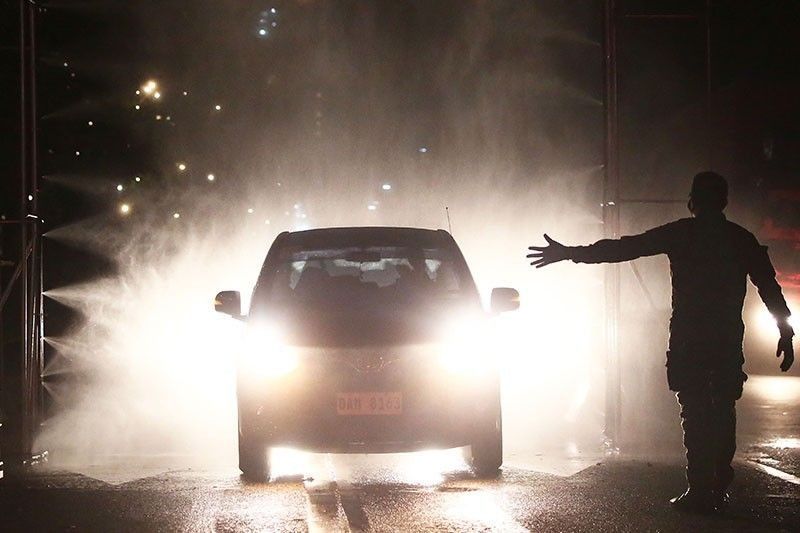What to do if you receive a subpoena from NBI? Diokno offers tips

MANILA, Philippines — As the government applies more stringent measures to contain the spread of the novel coronavirus in the country, law enforcement agencies are too engaged in another fight—against the spread of fake news.
Aside from maintaining peace and order amid this time of national pandemic, the Philippine National Police and the National Bureau of Investigation are cracking down on fake news online.
The NBI on Thursday said it sent out more than a dozen subpoenas to individuals for spreading fake news.
Veteran rights lawyer Chel Diokno gave the following tips if one receives a subpoena from the NBI:
What to do when you receive a subpoena
“Immediately get a lawyer. It will be better if you get someone known and trustworthy,” Diokno said in Filipino.
Diokno also advised not to go to the NBI office alone, but instead let the legal counsel do such.
READ: NBI to go after people 'causing panic, undermining government efforts' amid nCoV threat
If an NBI agent meanwhile contacts or visits you, Diokno said to write down their name and look for ID. If the agent is willing, take a photo of their ID too.
“Respectfully but sternly say you cannot answer their questions without your lawyer,” he added.
Your lawyer must also immediately ask for a copy of the complaint and supporting documents from the NBI.
Violations cited in arrests
Cybercrime Prevention Act
In February, the PNP filed a complaint against an optometrist in Cebu City for allegedly spreading false information about COVID-19.
The STAR reported that a complaint of online libel under Republic Act 10175 or the Cybecrime Prevention Act and of violation of Article 154 of the Revised Penal Code was filed against Josephil Brian Consuelo.
Article 154: Unlawful use of means of publication and unlawful utterances
Diokno on Thursday said he took on a case of an “ordinary citizen” who sought his help after receiving a subpoena from the NBI.
The subpoena sent to Diokno’s client in particular noted that the investigation will be into the individual’s “publicly posted article concerning an alleged misuse of government funds.”
It cited a supposed violation of Article 154 of the Revised Penal Code, which explains “unlawful use of means of publication and unlawful utterances.”
The provision penalizes printing, lithography, or any other means of publication shall publish or cause to be published as news any false news which may endanger the public order, or cause damage to the interest or credit of the State;
It also penalizes “any person who by the same means, or by words, utterances or speeches shall encourage disobedience to the law or to the constituted authorities or praise, justify, or extol any act punished by law.”
It remains unclear whether this decades-old law applies on online posts.
Article 142: Inciting to sedition
An ABS-CBN report on March 28 meanwhile said a public school teacher faces an inciting to sedition complaint for a post calling on people to troop to GenSan Lagao Gym where relief goods are stored.
Article 142 of the Revised Penal Code states that inciting to sedition can be done through speeches, proclamations, writings, emblems, cartoons, banners or other representations “that tend to disturb or obstruct any lawful officer in executing the functions of his office, or instigate others to cabal and meet together for unlawful purposes, or which suggest or incite rebellious conspiracies or riots, or which lead or tend to stir up the people against the lawful authorities or to disturb the peace of the community, the safety and order of the government, or who shall knowingly conceal such evil practices.”’
RELATED: Inside the inciting to sedition charge vs 'sharer' of 'Bikoy' videos
Bayanihan to Heal as One Act
During this state of public emergency, law enforcement authorities are also empowered to arrest those spreading false information under the Bayanihan to Heal as One Act, signed into law on March 24.
Section6(f) of Republic Act 11469, or the “Bayanihan to Heal as One Act”, punishes the following:
- Individuals or groups creating, perpetrating, or spreading false information regarding the COVID-19 crisis on social media and other platforms, such information having no valid or beneficial effect on the population and are clearly geared to promote chaos, panic, anarchy, fear or confusion
- Those participating in cyber incidents that make use or take advantage of the current crisis situation to prey on public through scams, phishing, fraudulent emails or other similar acts
Punishment may range from facing two months imprisonment or a fine of not less than P10,000. Courts may also impose a fine of up to P1 million.
Rights groups slammed this provision as "over-broad" and prone to abuse. — Kristine Joy Patag with a report from The STAR/Emmanuel Tupas
- Latest
- Trending






























